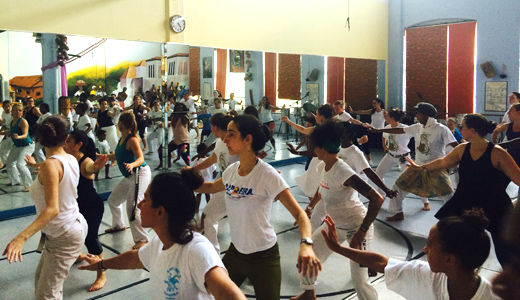
NEW HAVEN, Conn. – Community residents, children, youth, and families were introduced to the Afro-Brazilian martial art Capoeira here during an unprecedented women’s weekend with Brazilian Mestra Tisza Coelho. Tisza, one of the first women ever to become a Capoeira Master, traveled from Bahia, Brazil to teach at the event organized by Lisa Bergmann, the first female professora in her studio, to honor women and mothers.
Bergmann and Master Efraim Silva, who has been teaching and leading Capoeira Academy here for 27 years, kicked off the weekend with a crowded community class open for all to attend.
The youth and community members who crowded into the studio on a hot night enjoyed the interactive class and the opportunity to learn about another culture.
The weekend’s theme, “O Rio De Vida,” Portuguese for “River Of Life,” highlighted the expansion of Capoeira to women, showing that women who become mothers do not have to stop their Capoeira training and can also be great leaders. The opening session began with a prayer to honor two Orishas, or Gods from the African Yoruba tradition that represent life, the earth, and the spirit. Honored were Oshun, Goddess of rivers, lakes, and fertility; and Yemanja, the high mother Goddess, mother of all Orishas.
In respect for the Orishas, participants signed a petition asking President Obama to stop the pipeline construction in North Dakota and expressing support of the demands of the Standing Sioux Tribe to protect fresh water and sacred lands. Before the weekend was over, the government had halted construction for further investigation.
Capoeira’s roots originate in Angola and the Congo and combine dance, acrobatics, and music. The art form was developed in Brazil by enslaved West Africans who practiced the dance-like art form as training to escape to freedom. Capoeira is known for its quick and complex moves, using power, speed, and leverage for a wide variety of kicks, spins, and highly mobile techniques.
Bergmann uses the art form to encourage everyone of all genders and ages. She started practicing 14 years ago when she fell in love with the music and the “Roda,” or “Circle”, where people play Capoeira. Today Capoeira is celebrated worldwide for it’s mixture of dance, self-defense, and music.
Tisza began Capoeira in 1981 in Brazil. She started teaching in 1987, and then moved to Europe in 1991 where she taught and performed in many countries. In 1994, she came to the United States where she taught and lived in Boston and New York for several years.
Mestra Tisza is one of the few of the first generation of Capoeira women in Brazil, an art to which she has dedicated her whole life. She is an inspiration to Capoeristas around the world. Her amazing 15 year-old-daughter Dora Flor, also an incredible Capoeirista, helped lead the women’s weekend.
Participants in the weekend also learned from featured guest Janete Silva, a dancer, choreographer, performer, and educator from Salvador, Bahia, Brazil. Silva’s technique is a fusion of Capoeira and dance.
Capoeira is an art form for struggle and social justice and liberation from slavery. A word commonly used in Capoeira is “camara” which means comrade.
“Let’s take the energy from this event and use it to commit to social justice in our present day. That’s what Capoeira is about,” Bergmann told the participants as the weekend concluded. “We have present-day struggles that we must commit to continue the same way the struggle to end slavery was fought in Brazil.”
Photo: Participants in the Women’s Capoeira weekend in New Haven. | Lisa Bergmann / PW









Comments